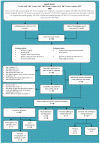Puzzle Pieces: Neural Structure and Function in Prader-Willi Syndrome
- PMID: 28943631
- PMCID: PMC5548261
- DOI: 10.3390/diseases3040382
Puzzle Pieces: Neural Structure and Function in Prader-Willi Syndrome
Abstract
Prader-Willi syndrome (PWS) is a neurodevelopmental disorder of genomic imprinting, presenting with a behavioural phenotype encompassing hyperphagia, intellectual disability, social and behavioural difficulties, and propensity to psychiatric illness. Research has tended to focus on the cognitive and behavioural investigation of these features, and, with the exception of eating behaviour, the neural physiology is currently less well understood. A systematic review was undertaken to explore findings relating to neural structure and function in PWS, using search terms designed to encompass all published articles concerning both in vivo and post-mortem studies of neural structure and function in PWS. This supported the general paucity of research in this area, with many articles reporting case studies and qualitative descriptions or focusing solely on the overeating behaviour, although a number of systematic investigations were also identified. Research to date implicates a combination of subcortical and higher order structures in PWS, including those involved in processing reward, motivation, affect and higher order cognitive functions, with both anatomical and functional investigations indicating abnormalities. It appears likely that PWS involves aberrant activity across distributed neural networks. The characterisation of neural structure and function warrants both replication and further systematic study.
Keywords: Prader-Willi syndrome; brain; neuroimaging; post-mortem; systematic review.
Conflict of interest statement
The authors declare no conflicts of interest.
Figures

Similar articles
-
Development of the eating behaviour in Prader-Willi Syndrome: advances in our understanding.Int J Obes (Lond). 2011 Feb;35(2):188-97. doi: 10.1038/ijo.2010.139. Epub 2010 Aug 3. Int J Obes (Lond). 2011. PMID: 20680019 Review.
-
Prader-Willi syndrome: From genetics to behaviour, with special focus on appetite treatments.Neurosci Biobehav Rev. 2015 Dec;59:155-72. doi: 10.1016/j.neubiorev.2015.10.003. Epub 2015 Oct 22. Neurosci Biobehav Rev. 2015. PMID: 26475993 Review.
-
The neurobiological drive for overeating implicated in Prader-Willi syndrome.Brain Res. 2015 Sep 16;1620:72-80. doi: 10.1016/j.brainres.2015.05.008. Epub 2015 May 18. Brain Res. 2015. PMID: 25998539
-
Neural mechanisms underlying hyperphagia in Prader-Willi syndrome.Obesity (Silver Spring). 2006 Jun;14(6):1028-37. doi: 10.1038/oby.2006.118. Obesity (Silver Spring). 2006. PMID: 16861608 Free PMC article.
-
An investigation into food preferences and the neural basis of food-related incentive motivation in Prader-Willi syndrome.J Intellect Disabil Res. 2006 Sep;50(Pt 9):633-42. doi: 10.1111/j.1365-2788.2006.00812.x. J Intellect Disabil Res. 2006. PMID: 16901290
Cited by
-
Progress in Brain Magnetic Resonance Imaging of Individuals with Prader-Willi Syndrome.J Clin Med. 2023 Jan 29;12(3):1054. doi: 10.3390/jcm12031054. J Clin Med. 2023. PMID: 36769704 Free PMC article. Review.
-
Grey matter volume and cortical structure in Prader-Willi syndrome compared to typically developing young adults.Neuroimage Clin. 2017 Dec 20;17:899-909. doi: 10.1016/j.nicl.2017.12.027. eCollection 2018. Neuroimage Clin. 2017. PMID: 29527494 Free PMC article.
-
Defining Hyperphagia for Improved Diagnosis and Management of MC4R Pathway-Associated Disease: A Roundtable Summary.Curr Obes Rep. 2025 Jan 25;14(1):13. doi: 10.1007/s13679-024-00601-z. Curr Obes Rep. 2025. PMID: 39856371 Free PMC article. Review.
-
A Transcriptomic Signature of the Hypothalamic Response to Fasting and BDNF Deficiency in Prader-Willi Syndrome.Cell Rep. 2018 Mar 27;22(13):3401-3408. doi: 10.1016/j.celrep.2018.03.018. Cell Rep. 2018. PMID: 29590610 Free PMC article.
-
Aberrant brain intra- and internetwork functional connectivity in children with Prader-Willi syndrome.Neuroradiology. 2024 Jan;66(1):135-144. doi: 10.1007/s00234-023-03259-x. Epub 2023 Nov 25. Neuroradiology. 2024. PMID: 38001311 Free PMC article.
References
-
- Siemensma E.P., van Wijngaarden R.F.T.L., Festen D.A., Troeman Z.C., van der Velden A.A., Otten B.J., Rotteveel J., Odink R.J., Bindels-de Heus G.C., van Leeuwen M., et al. Beneficial effects of growth hormone treatment on cognition in children with Prader-Willi syndrome: A randomized controlled trial and longitudinal study. J. Clin. Endocrinol. Metab. 2012;97:2307–2314. doi: 10.1210/jc.2012-1182. - DOI - PubMed
Publication types
LinkOut - more resources
Full Text Sources
Other Literature Sources

